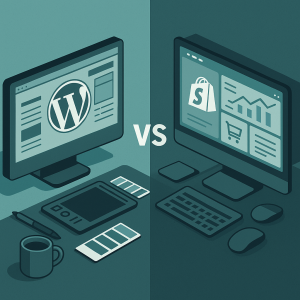In today’s digital-first world, having a professional website is no longer optional—it’s essential. Whether you’re a small business owner in Johannesburg, an e-commerce entrepreneur in Cape Town, or a growing brand in Pretoria, your website is the backbone of your online presence.
But when it comes to choosing the right platform, two names often dominate the conversation: WordPress and Shopify. Both are powerful, but they serve different needs. In this article, we’ll break down the differences and help you decide which platform is best for South African businesses.

What is WordPress?
WordPress is the world’s most popular content management system (CMS), powering more than 40% of websites globally. It’s flexible, open-source, and highly customisable. With WordPress, you can build almost any type of website—from a blog to a corporate website, a portfolio, or a full online store with WooCommerce.
Pros of WordPress:
✅ Highly flexible: Perfect for websites that need custom functionality.
✅ Thousands of themes and plugins to expand features.
✅ Great for SEO when set up correctly.
✅ WooCommerce allows you to run a full e-commerce store.
✅ Ownership: You fully own your site and hosting.
Cons of WordPress:
❌ Requires hosting and domain setup.
❌ More technical knowledge needed (plugins, updates, security).
❌ E-commerce requires WooCommerce and add-ons.
What is Shopify?
Shopify is a hosted e-commerce platform designed specifically for online stores. It’s simple, powerful, and comes with everything you need to sell products online—without needing advanced technical skills.
Pros of Shopify:
✅ Built for e-commerce: Product listings, payments, and inventory all included.
✅ Easy to use: Perfect for beginners.
✅ Secure and reliable hosting included.
✅ Excellent for multi-channel selling (Facebook, Instagram, TikTok integration).
✅ South African payment gateways supported (PayFast, PayFlex, Peach Payments, Yoco).
Cons of Shopify:
❌ Monthly subscription fees (USD pricing).
❌ Less customisable than WordPress.
❌ Limited blogging and content flexibility.
❌ Transaction fees unless you use Shopify Payments (not yet in SA).
Cost Comparison in South Africa
WordPress Costs:
Domain name: ± R100 – R200 per year
Hosting: ± R99 – R399 per month (depending on provider)
Premium theme/plugins: Optional (R500 – R3,000 once-off)
WooCommerce: Free (extra costs for advanced features)
👉 WordPress can be cheaper long-term, especially if you’re comfortable managing updates and plugins yourself.
Shopify Costs:
Monthly plans start at $29 USD (± R550) and go up to $79+ for growing stores.
Premium themes: ± $100–$250 one-time.
Extra apps often have monthly subscription costs.
👉 Shopify is more expensive, but you’re paying for convenience, hosting, and e-commerce tools built-in.
SEO: WordPress vs Shopify
For SEO in South Africa, both platforms can work well.
WordPress is more flexible with SEO plugins like Yoast SEO and Rank Math. You can optimise every detail, from meta titles to image alt text, and even add advanced schema.
Shopify is simpler, but more limited. It covers the basics like metadata, sitemaps, and SSL—but advanced customisation is harder.
👉 If SEO is a big part of your strategy (e.g., ranking in “SEO services Johannesburg” or “Buy shoes online South Africa”), WordPress gives you more control.
Payments in South Africa
This is where Shopify shines. Shopify integrates directly with PayFast, Peach Payments, PayFlex, and Yoco, making it easy for South African businesses to accept payments online.
WordPress/WooCommerce also supports PayFast and other gateways, but setup requires plugins and can be slightly more technical.
Who Should Use WordPress?
WordPress is ideal for:
Service-based businesses (law firms, agencies, consultants).
Companies that want a corporate website with a blog.
Brands needing a highly customised website.
Entrepreneurs who want to keep costs low and don’t mind learning a bit of tech.
Example: A Pretoria-based digital marketing agency that needs a portfolio, SEO blog, and client portal.
Who Should Use Shopify?
Shopify is ideal for:
E-commerce businesses focused on selling products online.
Entrepreneurs who want to get started quickly with little technical hassle.
Stores planning to scale fast (multi-channel sales, global reach).
Businesses needing reliable hosting and built-in security.
Example: A Cape Town fashion brand selling clothing online across South Africa with PayFast and Instagram Shopping integration.
WordPress vs Shopify: At a Glance
| Feature | WordPress (with WooCommerce) | Shopify |
|---|---|---|
| Cost | Lower long-term, flexible | Higher monthly, fixed plans |
| Ease of Use | Moderate (some learning) | Very easy |
| SEO | Highly customisable | Basic to moderate |
| Flexibility | Unlimited (with plugins) | Limited customisation |
| Best For | Blogs, corporate sites, SMEs | E-commerce, online stores |
| Hosting | Self-managed | Included |
Final Verdict: Which Is Best for South African Businesses?
The choice between WordPress and Shopify depends on your business goals:
If you want full control, flexibility, and SEO power → WordPress + WooCommerce is the best option.
If you want simplicity, built-in e-commerce tools, and don’t mind monthly fees → Shopify is the way to go.
At Repplass Creatives, we design and develop websites on both platforms. Whether you’re looking for a custom WordPress business site in Johannesburg or a Shopify e-commerce store in Cape Town, our team will guide you to the best solution for your needs and budget.
